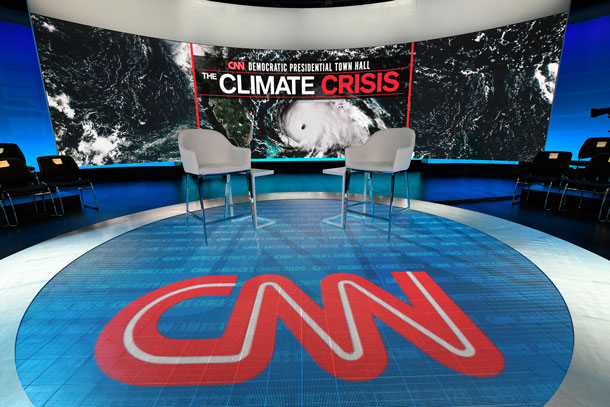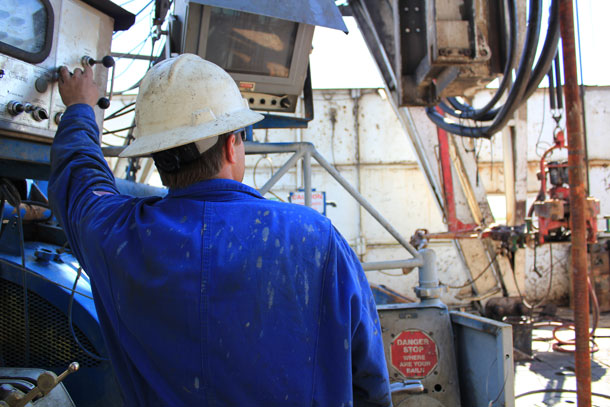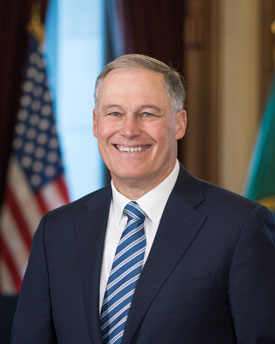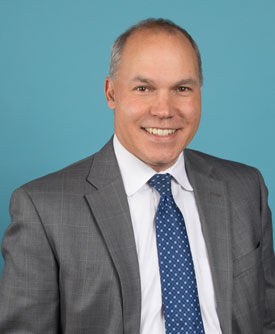Reviewing the Climate Crisis Town Hall
Air Date: Week of September 6, 2019

September 4th was the first the top ten Democratic candidates for President in 2020 had ever gathered to talk about climate in a lengthy national broadcast. (Photo: CNN)
Host Steve Curwood sits down with Joe Aldy, economist and Professor of Public Policy at the Harvard Kennedy School, to take a look at carbon pricing, a just transition for fossil fuel workers, and other key topics from the climate crisis town hall.
Transcript
CURWOOD: We’ll have more about the US presidential candidates in next week’s program. Joining us now is economist Joe Aldy, he’s a public policy professor at Harvard University’s Kennedy School. Welcome back to the show, Joe.
ALDY: Thank you, Steve. It's a pleasure to be here.
CURWOOD: So, you were in President Obama's White House. So, among all these candidates, do you have a dog in this fight?
ALDY: I look forward to a democratic president making some real progress on climate change. So, I don't have a dog in the fight. I'm not working with a campaign. But I'm thrilled to see a lot of the policy ideas they're bringing forward.
CURWOOD: So, this is the first time that a major news network has gathered 10 top Democratic presidential hopefuls on a stage to have them talk about climate change at length. Why do you think it took so long for us to get here?
ALDY: Well, it's fascinating, you can go back and look at, say, the 2012, or the 2016 presidential debates and climate change is barely mentioned at all. And I think it's really impressive to see the change in where we are in terms of the public debate about this issue. I think a lot of credit can be given to the students out there, who have really started to bring energy from a new voice to the debate. And I think that has helped really drive both the candidates to be much more ambitious. And for the media to start to really pay attention to the climate change issue.
CURWOOD: I saw the students asking tougher questions, than many of my journalistic colleagues would have asked given the opportunity,
ALDY: I was impressed at how well the students did, and I thought a few of the anchors maybe should go back to school.
CURWOOD: Now, carbon pricing figured fairly heavily in this series of town halls, whether it's cap and trade or a carbon tax, break those concepts down for us briefly.
ALDY: Regardless of whether it's a carbon tax, or cap and trade, the general intent is to put a price on the pollution that comes from burning fossil fuels, that then makes it that much more expensive to burn coal or burn gasoline or to use natural gas. That creates the incentive, then to one become more efficient in how we use energy, it also creates a much stronger incentive then to invest in solar energy and wind power. And so, the idea here is to say, we don't necessarily know in government the best most cost effective way to reduce emissions. But if we put a price on the pollution, we’re going to create incentives for companies and for families, to find the lowest cost way of reducing their emissions. Now, the difference between a tax and cap and trade, though is that a tax is explicitly setting the price, cap and trade sets an aggregate quantity and emissions goal, and then gives firms the right to emit that they can buy and sell with each other.

Presidential candidates had to navigate criticisms of the fossil fuel industry while ensuring a just transition for the industry’s workers. (Photo: Lindsey G., Flickr, CC BY 2.0)
CURWOOD: So, if cap and trade and carbon taxes both reduce carbon, which one is the better approach?
ALDY: Which one's the better approach? The one that can get signed into law? There's two key characteristics that will impact the effects of those policies on the typical American one is going to be do we use these revenues to benefit them or not? The second thing is a question of, do you want to have certainty on the emissions outcome? In which case, you might like cap and trade? Or do you prefer certainty about the price and the cost of the policy, in which case you might like a carbon tax. But as someone who worked on cap and trade in a failed effort in 2009, and 2010, in government, there's also a part of me that's willing to try a carbon tax to see if there's a way you can navigate the politics to get it through Congress. At the end of the day, I think it's really important for us to price carbon as a key tool in any kind of climate change program. So, I think they're both a tremendous step forward from our existing authorities under current law.
CURWOOD: Now, there were several questions, Joe, that focused on what personal sacrifices the American public would have to make to deal with climate disruption, weather will be giving up cheeseburgers, incandescent light bulbs, others focused on the fossil fuel companies pointing the finger to them as the biggest contributors to this crisis and their role in disinformation, your take.
ALDY: I think that if we're talking about plastic straws, we're not focusing on what's really important here. We need to change the energy foundation of our economy. So virtually every activity a business undertakes a family undertakes in a given day, has some impact on the climate. That's why we need to have really strong ambitious climate change policy. There are big problems like this that we can't just solve on our own. Focusing on personal sacrifice, I think is missing the point that we need effective public policy to drive changes in behavior in the near term, and incentives for innovation in the long term.
CURWOOD: To what extent do you think the talk about personal sacrifice is pushback from folks who don't want to see us move ahead on dealing with climate disruption?
ALDY: Well, wouldn't surprise me we've seen different ways of framing a problem to try to slow down progress. It's one of my colleagues refers to this as the solution aversion problem, some of the people who when you pull them publicly why they aren't sure about climate change, they may be denying climate change is not that they are really denying the science of climate change, they may be averse to the potential solutions, and they think there's potential solutions may be really uncomfortable for them, or really expensive for them. And so, that may be the reason why they don't necessarily support taking action on the issue.
CURWOOD: Let's talk about the big worry that many have about changing our energy economy to deal with climate change. And that's, of course, jobs. And when you shut down coal mines, or you close down oil fields, and such people lose jobs, not just the people but the communities. So how did the folks on the town hall stage deal with the question of having what some would call a just transition.

Though Washington Governor Jay Inslee has left the Democratic primary race, his strong plans for battling the climate crisis left a clear impression on the candidates still in the running. (Photo: Governor Jay Inslee, Flickr, CC BY-ND 2.0)
ALDY: So, for some of these industries, they're already undergoing a transition. Coal is undergoing a transition; we have seen employment in the coal industry fall quite dramatically over the past decade. And while there are some who would blame environmental regulations for that, I think that's for the most part a testament to market forces. It's been the success of innovation in fracking that has driven down dramatically, the cost of producing natural gas that has helped natural gas dramatically increase its market share in the power sector and displace coal. So right now, we're just relying on the markets, which to be honest, markets don't care if a job is lost at a coal mine, because the job is created at an oil and gas field. Markets can be ruthlessly efficient in that way. And right now, without any policy framework, those cold communities in Appalachia are hurting without a policy response. We saw a number of the candidates describe how they could envision a way of providing resources to help in the short term, the potential for trying to provide training the potential to diversify those economies. I mean a coal miner who loses his or her job, it's not just that they want to have money to help support the family, they do. But there's also the self-esteem and the confidence of doing something productive with your day that comes with being employed.
And I'll be honest, dealing with this, when we think about the number of jobs as tech with coal is going to be easier than when we think about more broadly with fossil fuels. The employment in oil gas is dramatically higher, both directly for oil and gas drilling. And for those who service oil and gas operations. The question, of course, is do we find there to be opportunities in the production of turbines for wind farms, or solar panels or the next generation of energy efficient technologies, where we are creating good paying manufacturing jobs, that the next group of workers coming into the workforce instead of going into a fossil fuel industry job they're excited to go into a clean energy industry job. And I think that's, that's one of the key challenges that we have. You know, I think there's a lot from the plans that we heard in the town hall, where they can candidates are looking at that opportunity for creating jobs and a new growing industry that can help offset some of those losses in the others.
CURWOOD: Joe, we're just about out of time, but from your perspective, who helped themselves in this process, do you think?

Joe Aldy is an economist and professor of public policy at Harvard’s Kennedy School. (Photo: Courtesy of Joe Aldy)
ALDY: My first answer will be Jay Inslee. Now, it's fascinating, he wasn't on stage speaking. But I think Governor Inslee brought a lot of ideas and enthusiasm about climate change. It didn't resonate enough for him to stay in the campaign. But having said that, you heard a number of the candidates talk about the very thoughtful plan that he has brought to the table, the fact that he organized campaign around climate change. It says to me, it says something that you can be a governor of a state and as a governor, you have to care about a lot of issues. But when he just said, I'm going to run for president, this is the number one issue. This is the fundamental issue facing America in the 21st century. So, I think the fact that he has these ideas, I think the term was using their sort of open source. I thought that was fantastic. And I think it reflects that among Democrats, this that issue that they take very seriously. You know, there are some who I thought did a great job. I thought Senator Warren did great. Senator Warren, I think is great when she is passionately talking about how public policy can better the lives of Americans. And I thought, you know, there was some we were frustrated. We didn't have a debate. I think it was good. We didn't have a debate. Climate change isn’t simple. And so, you know, my friends in communications say you got to figure out a better way to talk about climate change. But sometimes you need to talk about difficult, complicated issues in depth, and I thought the format in the town hall provided that opportunity.
CURWOOD: Joe Aldy is an economist who teaches at the Harvard Kennedy School of Government. Joe, thanks so much for taking the time with us today.
ALDY: Thank you, Steve.
Links
The New York Times | “CNN Climate Town Hall: Here’s What You Need to Know”
Living on Earth wants to hear from you!
Living on Earth
62 Calef Highway, Suite 212
Lee, NH 03861
Telephone: 617-287-4121
E-mail: comments@loe.org
Newsletter [Click here]
Donate to Living on Earth!
Living on Earth is an independent media program and relies entirely on contributions from listeners and institutions supporting public service. Please donate now to preserve an independent environmental voice.
NewsletterLiving on Earth offers a weekly delivery of the show's rundown to your mailbox. Sign up for our newsletter today!
 Sailors For The Sea: Be the change you want to sea.
Sailors For The Sea: Be the change you want to sea.
 The Grantham Foundation for the Protection of the Environment: Committed to protecting and improving the health of the global environment.
The Grantham Foundation for the Protection of the Environment: Committed to protecting and improving the health of the global environment.
 Contribute to Living on Earth and receive, as our gift to you, an archival print of one of Mark Seth Lender's extraordinary wildlife photographs. Follow the link to see Mark's current collection of photographs.
Contribute to Living on Earth and receive, as our gift to you, an archival print of one of Mark Seth Lender's extraordinary wildlife photographs. Follow the link to see Mark's current collection of photographs.
 Buy a signed copy of Mark Seth Lender's book Smeagull the Seagull & support Living on Earth
Buy a signed copy of Mark Seth Lender's book Smeagull the Seagull & support Living on Earth

